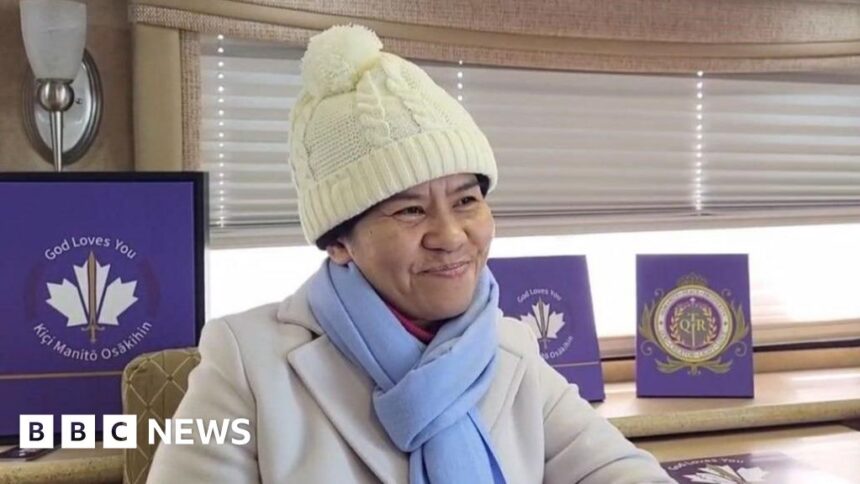The self-proclaimed “Queen of Canada” Romana Didulo, whose QAnon-inspired movement has left a trail of disruption across the country, was arrested Wednesday in a dramatic police operation in Richmound, Saskatchewan. This marks a significant turning point for a figure whose increasingly volatile influence has worried security experts for years.
RCMP officers surrounded Didulo’s recreational vehicle convoy—which her followers call the “royal fleet”—after receiving reports of threatening behavior toward local residents. According to witnesses, Didulo and several key lieutenants were taken into custody after a tense two-hour standoff that drew dozens of spectators to the small prairie town.
“The individuals were detained following multiple complaints regarding harassment, uttering threats, and interference with critical infrastructure,” said RCMP Superintendent Claire Reeves at a hastily arranged press conference. “This operation was conducted with public safety as our primary concern.”
Didulo’s rise to prominence represents one of Canada’s most troubling examples of extremist movements gaining traction in the digital age. Since 2021, the Filipino-Canadian conspiracy theorist has amassed thousands of followers by claiming to be Canada’s rightful monarch, appointed by extraterrestrial beings and a secret military tribunal that supposedly executed Queen Elizabeth II.
What makes Didulo particularly concerning to authorities is her record of inciting real-world action. Her followers have distributed fake “cease and desist” orders to healthcare facilities during COVID-19 vaccination campaigns, attempted “citizen’s arrests” of police officers, and disconnected utilities they claimed were government surveillance devices.
Former follower Marcus Delaney, who spent six months in Didulo’s inner circle before becoming disillusioned, told CO24 News that her influence over vulnerable people has been devastating.
“She preys on people going through hard times—folks who’ve lost jobs, homes, or family connections,” Delaney explained. “She offers them a complete alternative reality where they’re fighting a righteous battle against imaginary enemies.”
Security experts at the Canadian Centre for Extremism Research have documented how Didulo’s movement evolved from online conspiracy theories to increasingly confrontational tactics. “What we’re seeing is a textbook case of how digital radicalization translates to physical threats,” said Dr. Amira Hassan, the Centre’s director of monitoring and assessment. “Her followers genuinely believe they’re operating under royal decrees that supersede Canadian law.”
The arrest comes after mounting pressure on authorities to address the movement’s activities. Last month, a CO24 Politics investigation revealed how Didulo’s convoy has left unpaid bills exceeding $75,000 at campgrounds and hotels across multiple provinces, with owners reporting intimidation when requesting payment.
Saskatchewan Premier Scott Moe acknowledged the situation during a press conference on provincial infrastructure, noting that “fringe movements that threaten community safety will be addressed with the full force of the law.”
For residents of communities where Didulo’s group has camped, the arrest brings relief. “They were telling people they didn’t have to pay utility bills or taxes anymore,” said Richmound town councillor Janet Peterson. “Some vulnerable residents actually believed them and now face serious financial consequences.”
Financial records obtained by CO24 News indicate Didulo’s operation has collected substantial donations from followers, many sending their last savings in exchange for promises of debt forgiveness and protection from supposed government persecution.
Legal experts suggest Didulo could face multiple charges, including counseling criminal offenses, uttering threats, and possibly fraud-related charges connected to her fundraising activities.
As Canadian authorities grapple with this unprecedented case, serious questions emerge about the intersection of free speech, mental health, and public safety in an age of weaponized misinformation. How do we as a society protect vulnerable individuals from falling prey to extremist ideologies while preserving the democratic freedoms that define our nation?










